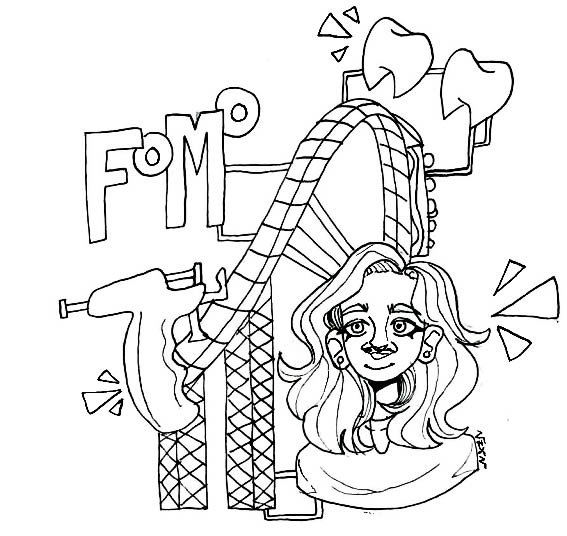Bright Side of FOMO

FOMO: noun. Also known as “the fear of missing out.”
October 14, 2021
I walked into Claire’s jewelry store nervous and trembling about the pain I was about to experience. What if I bleed out? What if I get a deadly infection? All these thoughts raced through my head as I sat in the chair and tightly hugged the teddy bear in my lap. After all, it was only my seventh birthday when my mom took me to get my ears pierced.
“Do you want them pierced separately or at the same time?” the Claire’s employee asked.
At the moment, I didn’t know what possessed me to reply with “one at a time” but I do now.
66% of teens and young adults suffer from the fear of missing out (FOMO) but maybe the term “suffering” isn’t fitting. I believe FOMO is actually a positive thing; it means that I am motivated enough to try new things whether I’m scared of them or not. At the end of the day, I am far more scared to have not tried them. That said, I wanted to remember getting my ears pierced so vividly that I chose to feel the throbbing pain of each individual ear as it got punctured by the needle.
FOMO is also the reason my first-ever roller coaster was the Goliath at Great America and why I pulled both of my front teeth out on Christmas by tying dental floss around them and a door handle before slamming it close.
Some may see these tendencies as irrational and insane, but it’s just my way of coping with my own FOMO. After all, I am now part of an elite group of people who could have honestly sung “All I Want for Christmas is my Two Front Teeth.”
My fear of missing out has to lead me to some of the greatest memories at DGN: traveling downstate to see the girls’ volleyball team placed second in 2018, flying to Washington DC with the Omega, and screaming my voice raw at every sporting event I go to, giving me the opportunity to become an N-Zone leader.
I have all these incredible memories because I forced myself to take advantage of each opportunity given to me. I was terrified of living a completely average high school experience, terrified of missing out on what some people say could be the greatest four years of one’s life.
There’s no doubt in my mind that 50% of teens are addicted to technology, which in turn leads to worse and worse FOMO. The feelings of isolation and envy that stem from such fear deteriorate teenagers’ mental health. However, while some view those as negative emotions, those feelings only motivate me to keep stretching myself out of my comfort zone
I know that if I continue losing my voice for days on end, filling my camera roll up with pictures, and coming to school early or staying there late, I am doing something right.

























